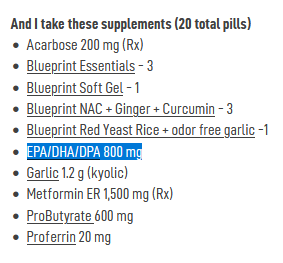Neo
#56
I’ll be re-testing towards the end of the month. Will use the Tom Dayspring (and I think Peter Attia) recommended
they also have a streamlined, cheaper version
very easy as you just to it from home.
@约瑟夫_拉维尔 , btw, have you tested for heavy metals if you eat fish that often?
2 Likes
Neo
#57
Any thoughts on that @Olafurpall and others seems to suggest that higher EPA / DHA ratio may be better?
No testing for heavy metals. I don’t have any reason to think I’m having a problem in that area.
I eat smaller, wild caught fish.
1 Like
A_User
#59
I don’t know anything about it, I’m having flashbacks to O3:O6 ratio and it’s not good.
The supplement I take is based on algae oil so I don’t think there is any other ratio from that source.
1 Like
A_User
#60
Funny, I just realized Bryan Johnson swapped to the same Omega-3 supplement I take. He takes double the dosage for 600 mg EPA and 1000 mg DHA in total. That might be better for at least focus and attention.

I don’t know whether he thinks the ratio between EPA and DHA is important or not.
Neo
#61
It may also be that he is vegan while I’m partially pesca vegan.
He originally was doing EPA only, it seems…
https://www.reddit.com/r/blueprint_/comments/14smc77/why_does_bryan_only_take_epa_and_not_dha/
And from X more recently
2 Likes
A_User
#62
It’s best if you ask them as they are making the claims. I would like to know as well.
scta123
#63
Which one is that? I remember you said something about algae O3.
A_User
#64
It’s linked in Bryan’s page:
scta123
#65
Why did you choose this source of O3 over others? I don’t supplement with O3, but this algae source seems interesting… it is not cheap at supplementing at high dose but otherwise seems legit.
Neo
#66
I might mix this in and lower my fish ones. But what do we think about the processing here?
I do like the:
Most Omega-3 supplements are made from unsustainable fish oil, killing as many as 50 fish per bottle and transferring toxins from the oceans into each capsule - but the Omega-3 actually comes from the animal’s diet of algae, not the fish itself. So, we’ve skipped the middle-fish and created a safer, more sustainable alternative from microalgae, grown in tanks at a specialist manufacturing facility.
A_User
#67
Because I am vegan for almost a decade, so it is an ethical reason only.
If the fish oil was cultured I wouldn’t mind. But now it is using conscious fish.
2 Likes
Tim
#68
@John_Hemming
If I had a blood test every week, I wouldn’t have any veins left.
1 Like
Luckily my protocol appears to speed up wound healing so the arm I normally use normally has the prevoius week’s wound disappear before the next puncture. I have just taken a photo and will attach it t this post. My last venepuncture was on Wednesday and today is Sunday.
1 Like
Tim
#70
@John_Hemming
Looks like a fistula.
1 Like
Sorry for the late reply. That’s a little high ratio but it’s fine.
Yes I personally would keep the ratio of EPA/DHA somewhere between 1:1 and 2:1.
3 Likes
Attia weighs in on Omega-3 and AFib.
1 Like
Looking at his take from that article
So what’s my take? An association between supplemental n3FA and increased risk of AFib seems likely to exist, but perhaps only for those already at significant risk for cardiovascular events. Current research using existing data is further interrogating the question of n3FA supplementation and associated risk of AFib and may help shed light on how such an association might depend on prior CVD risk factors. The Global Organization for EPA and DHA is currently conducting its own meta-analysis covering a large number of studies, and the Fatty Acids and Outcomes Research Consortium, which has collected massive volumes of lipid data from study populations over many years, is looking now at AFib endpoints among its datasets. Pending further insight, all patients who are advised to take supplemental or prescription n3FA products should also be advised of the potential risks, and caution is warranted particularly for those with a predisposition to AFib. Given the existing evidence that n3FA supplementation may alternatively reduce CVD-associated risk, I weigh the benefits with the risk for each patient, and individual characteristics like heart rate, HRV, TG, and CVD history are important considerations to assess whether n3FA supplementation provides more harm or benefit.
There is a probably a threshold with Omega 3 when the level of supplementation causes some issues.
I did experiment with Omega 3 a couple of years ago and found that when I stopped taking supplementary capsules twice a week I noticed a deterioration. I now take a capsule a day 3g of fish oil 1.3g EPA 0.9g DHA. There is no massively complex calculation behind this. I don’t think there is any doubt that this helps with the formation of better quality membranes. Where the AFib risk is in terms of dosage I don’t know.
I have got my resting heart rate back down below 50 mainly through not drinking as much as I was and am otherwise doing quite well in terms of a range of tests. Hence I intend to stick with one of these capsules a day.
2 Likes
A_User
#74
Fuhrman recommends Omega-3 index above 6. Most people 250 mg EPA+DHA should work. Too much not good either (bleeding risk, AFIB?). The longer time the better.
It takes 3 months for blood cells to change or something, so when intake can change the Omega-3 index result.
I don’t think people should look at only short-term gains. Things are looking exponential and compounding…?
2 Likes
You are taking Vetology algae omega-3, which contains 300mg EPA and 500mg DHA. Would you reduce this to just one capsule per day?